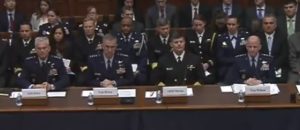U.S. military leaders continue to strongly support New START, the arms control treaty between the United States and Russia that limits each country to no more than 1,550 deployed, long-range nuclear weapons by 2018.
The problem is that President Donald Trump is apparently unwilling to listen to their sage advice.
Back on January 28, in his first phone call with Russian President Vladimir Putin, President Trump reportedly attacked New START, calling it a “bad deal.” It seems any agreement this president did not personally negotiate is a loser.

Gen. Hyten, Gen. Selva testify in support of New START before the House Armed Services Committee, March 8, 2017
And that is unfortunate, because according to the Reuters report that broke the story, Putin had raised the possibility of the two countries using New START’s built-in option to extend the treaty’s life by five years. Such an extension is definitely in the US national security interest: From boots-on-the-ground inspections to detailed data exchanges, the treaty provides verification and predictability that US military leaders consistently desire.
Strategic Commander is “Big Supporter”
Just last week, Air Force Gen. John Hyten, who as commander of the U.S. Strategic Command is responsible for all U.S. nuclear forces, was asked about New START in a Congressional hearing. He testified:
I’ve stated for the record in the past, and I’ll state again, that I’m a — a big supporter [of the treaty]. … when it comes to nuclear weapons and nuclear capabilities, that bilateral, verifiable arms control agreements are essential to our ability to provide an effective deterrent.
In the same hearing, Air Force Gen. Paul Selva, vice chairman of the Joint Chiefs of Staff, testified that when New START was considered by the Senate:
the Joint Chiefs reviewed the components of the treaty and — and endorsed it. It is a bilateral, verifiable agreement that gives us some degree of predictability on what our potential adversaries look like.
While it seems he doesn’t listen to military leaders like these, it’s not clear just who President Trump does listen to. Reuters reported the president stopped his call with Putin to ask someone unknown what the treaty was before telling the Russian leader that it was a bad deal.
And it doesn’t stop there. More recently, on February 23, the president repeated his criticism of New START, this time in an interview where he declared that the treaty is “a one-sided deal like all other deals we make. It’s a one-sided deal. It gave them things that we should have never allowed. … Just another bad deal that the country made.”
New START passed a high bar for Senate ratification
Before they can become the law of the land, treaties must pass a high bar: approval by two-thirds of U.S. Senate. The threshold was set to ensure that “bad deals” don’t happen. In the case of New START, 71 senators voted in favor of the treaty, including 13 Republicans. It became the first major arms control treaty negotiated by a Democratic president and endorsed by the Senate. Perhaps this, more than any other reason, is why President Trump dislikes the treaty.
But it took compelling reasons to get those 71 Senate votes, and then just as now, military leaders gave strong support to the treaty. Perhaps most compelling, seven former heads of U.S. Strategic Command wrote a letter to the Senate endorsing the treaty. After detailing several reasons why the treaty was in U.S. national security interests, the letter concluded,
The New START Treaty will contribute to a more stable U.S.-Russian relationship. We strongly endorse its early ratification and entry into force.
While overall the U.S.-Russian relationship has deteriorated, the New START agreement has been one bedrock of constancy. That is what military leaders sought when the treaty was first negotiated, and why they still support it now. President Trump should start listening to their advice, and stop attacking New START. Instead, he should respond to Putin’s suggestion and extend the treaty by five years.
